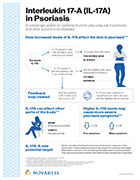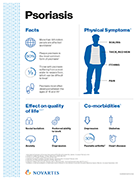
Novartis receives approval in the EU for Cosentyx® label update, includes long term superiority data versus Stelara® in psoriasis
- Label update includes 52 week data from CLEAR study demonstrating long-term superiority of Cosentyx® versus Stelara® in psoriasis1,2
- Update also includes use of Cosentyx in moderate-to-severe scalp psoriasis1 – one of the most difficult-to-treat types of psoriasis3
- Cosentyx is the first interleukin-17A (IL-17A) inhibitor approved to treat psoriasis, psoriatic arthritis (PsA) and ankylosing spondylitis (AS)
Basel, July 06, 2017 – Novartis announced today that the Committee for Medicinal Products for Human Use (CHMP) has approved a label update for Cosentyx® (secukinumab), the first interleukin-17A (IL-17A) approved to treat psoriasis. The label update includes 52 week data from the CLEAR study demonstrating the long-term superiority of Cosentyx versus Stelara® * (ustekinumab) in psoriasis1,2. The updated label also includes use of Cosentyx to treat moderate-to-severe scalp psoriasis1 – one of the most difficult-to-treat forms of psoriasis3, which affects approximately 60 million people worldwide4,5. The updated label is based on the proven efficacy and consistent safety profile of Cosentyx1.
The addition of the CLEAR study data in the European product label reflects the benefit of Cosentyx for people living with this chronic and often distressing condition3. The 52 week data show that Cosentyx is superior to Stelara in delivering long-lasting clear or almost clear skin over one year of treatment in adults with moderate-to-severe psoriasis2. Cosentyx remained consistently superior to Stelara in achieving and sustaining a PASI 90 response (76% versus 61%) and significantly better in achieving a PASI 100 (clear skin) response (46% versus 36%) at Week 522.
The updated label for Cosentyx on scalp psoriasis, in a difficult-to-treat area of the body3, addresses an important unmet need. Many patients with scalp psoriasis do not achieve an adequate response from currently available treatments6. Also, scalp psoriasis can be particularly challenging to treat as disease activity is often maintained through hair care, scratching, and shampooing of the scalp, adding to the fact that the application of topical treatments is challenging3. Approximately half of all 125 million patients with psoriasis worldwide suffer from scalp psoriasis4,5.
“We are happy to see these two important label updates for our IL-17A-inhibitor, Cosentyx, the first IL-17A inhibitor approved to treat psoriasis. We are continually investigating new areas for Cosentyx to significantly enhance patients’ quality of life, such as scalp psoriasis,” said Vas Narasimhan, Global Head, Drug Development and Chief Medical Officer, Novartis. “Cosentyx is an innovative, groundbreaking treatment for people living with auto-inflammatory diseases, and we’re proud to continuously expand treatment possibilities for an even greater number of patients.”
Cosentyx is currently the only fully human IL-17A inhibitor to demonstrate efficacy and safety in a dedicated Phase III study of scalp psoriasis. The CHMP approval is based on results from the 24 week study of moderate-to-severe scalp psoriasis where Cosentyx demonstrated superior efficacy compared to placebo7. Psoriasis Scalp Severity Index (PSSI) 90 responses were achieved by a significantly greater percentage of patients receiving Cosentyx 300 mg (53%) than placebo (2%) at Week 12 (P<0.001)7.
The label update is applicable to all European Union and European Economic Area countries. Cosentyx is approved in more than 75 countries for the treatment of moderate-to-severe plaque psoriasis. Cosentyx is also approved in more than 70 countries for the treatment of active PsA and AS.
About psoriasis
Psoriasis is a common, non-contagious, auto-immune disease that affects more than 125 million people worldwide4. Plaque psoriasis is the most common form of the disease and appears as raised, red patches covered with a silvery white buildup of dead skin cells. Scalp psoriasis is a form of psoriasis that is reported to affect approximately half of all patients with psoriasis5. The disease has a significant impact on patients' quality of life, which is an aspect of the disease underestimated by most physicians3.
Psoriasis is not simply a cosmetic problem, but a persistent, chronic (long-lasting), and sometimes distressing disease, which can affect even the smallest aspects of people’s lives on a daily basis. Up to 30% of patients with psoriasis have, or will develop, PsA8. PsA is a condition in which the joints are also affected, causing debilitating symptoms including pain, stiffness and irreversible joint damage8,9. Psoriasis is also associated with other serious health conditions, such as diabetes, heart disease and depression8.
About Cosentyx and IL-17A
Launched in January 2015, Cosentyx is a targeted treatment that specifically inhibits the IL-17A cytokine. Research suggests that IL-17A may play an important role in driving auto-inflammatory conditions in enthesis and ultimately the body's immune response in psoriasis, PsA and AS10,11.
Cosentyx is approved in more than 75 countries for the treatment of moderate-to-severe plaque psoriasis, which includes the US, Canada, the European Union countries, Japan, Switzerland and Australia. In Europe, Cosentyx is approved for the first-line systemic treatment of moderate-to-severe plaque psoriasis in adult patients1. In the US, Cosentyx is approved as a treatment for moderate-to-severe plaque psoriasis in adult patients who are candidates for systemic therapy or phototherapy (light therapy)12.
Cosentyx is the first IL-17A inhibitor approved in more than 70 countries for the treatment of active PsA and AS, which includes the US and the European Union countries. Cosentyx is also approved for the treatment of PsA and pustular psoriasis in Japan1.
About the CLEAR study2
CLEAR (Comparison to assess Long-term Efficacy, sAfety and toleRability of secukinumab versus ustekinumab) is a multi-center, double-blind, parallel-group study of Cosentyx (n=335 versus Stelara (n=336) to compare efficacy, safety, and tolerability in adults with moderate-to-severe plaque psoriasis. Patients were randomized to receive either Cosentyx (300 mg) by subcutaneous injection at Baseline, Weeks 1, 2 and 3, then every four weeks from Week 4, or Stelara (dosing per package label). Cosentyx achieved the primary objective of superior PASI 90 response at Week 16. The 52 week PASI 90 response is a secondary objective in this study. PASI 100 and PROs responses (including DLQI) at 52 weeks are exploratory endpoints.
About the SCALP study7
This study is a randomized, double-blind, placebo-controlled study to evaluate the efficacy and safety of Cosentyx in 102 patients with moderate-to-severe scalp psoriasis. Eligible patients were equally randomized to either subcutaneous Cosentyx 300 mg or placebo at Weeks 0, 1, 2 and 3, then every four weeks for 12 weeks. At Week 12, patients in the placebo group who did not achieve at least a 90% improvement from baseline in the Psoriasis Scalp Severity Index (PSSI) score were re-randomized to Cosentyx 300 mg until study completion. The primary endpoint was the proportion of patients who achieved PSSI 90 response rate at Week 12.
